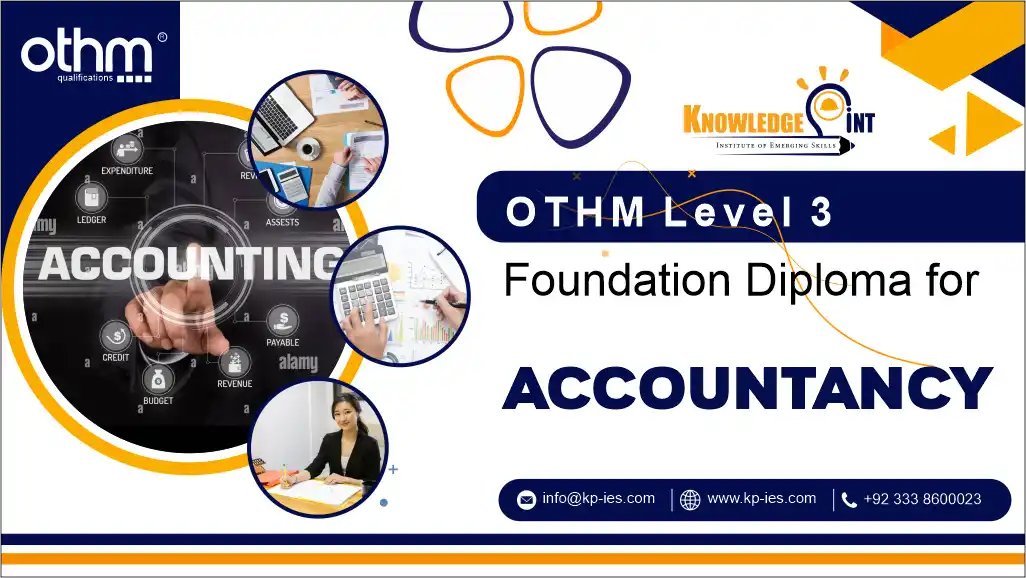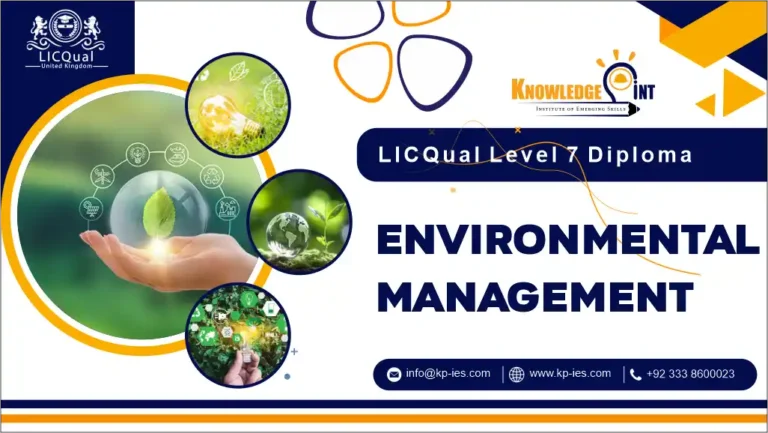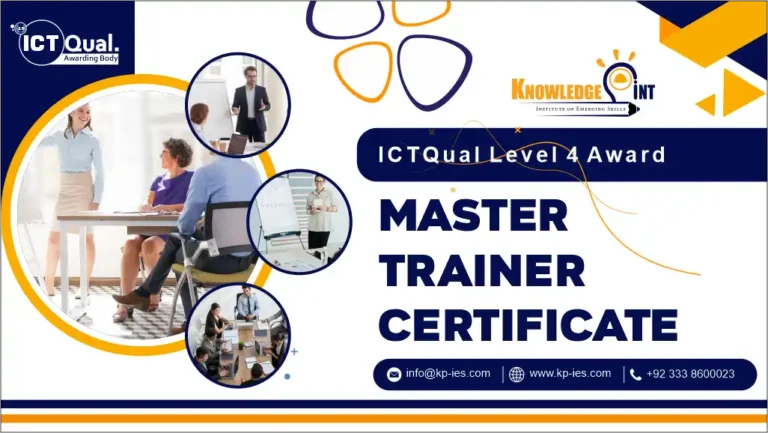In the world of finance and business, having a solid understanding of accountancy is crucial. The OTHM Level 3 Foundation Diploma in Accountancy provides a comprehensive introduction to this vital field, equipping learners with the foundational knowledge and skills necessary for a successful career in accountancy and finance. Whether you’re just starting your career journey or looking to enhance your existing skills, this diploma is designed to set you on the path to success.
The OTHM Level 3 Foundation Diploma in Accountancy is an entry-level qualification that introduces learners to the essential principles and practices of accountancy. The course covers a broad range of topics, ensuring that students gain a thorough understanding of the fundamental concepts and techniques used in accounting and financial management.
The OTHM Level 3 Foundation Diploma in Accountancy is a valuable qualification for anyone looking to start or advance their career in the accounting and finance sector. By providing a comprehensive introduction to essential accounting principles and practices, this diploma prepares learners for a wide range of career opportunities and further educational pursuits. Whether you’re just beginning your career journey or seeking to enhance your skills, the OTHM Level 3 Foundation Diploma in Accountancy offers the knowledge and tools you need to succeed. Invest in your future today and take the first step towards a rewarding career in accountancy.
Course Overview
The OTHM Level 3 Foundation Diploma in Accountancy consists of 3 mandatory units which are as follows.
The OTHM Level 3 Foundation Diploma in Accountancy is designed to equip students with the essential skills and knowledge required for successful academic progression. Here are the key learning outcomes for each module:
Recording Financial Transactions
- Understanding Accounting Principles: Gain a thorough understanding of fundamental accounting principles, including the double-entry system and the accounting equation.
- Accurate Transaction Recording: Develop the ability to record financial transactions accurately, ensuring that all entries are complete and correct.
- Use of Journals and Ledgers: Learn to use journals and ledgers to document financial transactions, including sales, purchases, payments, and receipts.
- Preparation of Financial Statements: Understand how to prepare basic financial statements such as income statements and balance sheets from recorded transactions.
- Compliance and Regulation: Gain knowledge of regulatory requirements and standards for recording financial transactions, ensuring compliance with relevant laws and practices.
- Reconciliation of Accounts: Develop skills in reconciling accounts to ensure that financial records match bank statements and other financial documentation.
- Error Detection and Correction: Learn techniques for detecting and correcting errors in financial records to maintain accuracy and reliability.
Management Information
- Data Collection and Analysis: Understand the methods for collecting and analyzing financial data to support business decision-making.
- Budgeting and Forecasting: Gain skills in creating budgets and financial forecasts to plan and control financial resources effectively.
- Variance Analysis: Learn to perform variance analysis to compare actual performance against budgeted figures and identify reasons for deviations.
- Performance Measurement: Develop the ability to measure and evaluate business performance using key financial indicators and metrics.
- Reporting for Management: Learn how to prepare and present financial reports for management, including dashboards, charts, and detailed analysis.
- Decision-Making Support: Understand how to use management information to support strategic decision-making, operational planning, and performance improvement.
- Use of Financial Software: Gain proficiency in using financial software and tools to generate, analyze, and report management information.
Maintaining Financial Records
- Record-Keeping Systems: Understand different types of record-keeping systems and their importance in maintaining accurate and reliable financial records.
- Documentation Standards: Learn the standards and best practices for maintaining financial documentation, including invoices, receipts, and contracts.
- Data Integrity and Security: Develop skills in ensuring the integrity and security of financial data, including data entry procedures and access controls.
- Updating Financial Records: Gain the ability to update and maintain financial records consistently, ensuring they reflect the latest transactions and financial activities.
- Archiving and Retrieval: Learn methods for archiving financial records and ensuring they can be retrieved efficiently when needed for audits, analysis, or reporting.
- Regulatory Compliance: Understand the legal and regulatory requirements for maintaining financial records, including retention periods and compliance with tax laws.
- Auditing and Verification: Develop skills in auditing and verifying financial records to ensure accuracy and completeness, preparing for internal and external audits.
These learning outcomes ensure that students completing the OTHM Level 3 Foundation Diploma in Accountancy are well-prepared to handle key accounting tasks, support management with accurate financial information, and maintain comprehensive and compliant financial records.
Course Benefits of the OTHM Level 3 Foundation Diploma in Accountancy :
1. Specialized Expertise
- Auditing Proficiency: Gain specialized knowledge and skills in auditing energy management systems according to the ISO 50001:2018 standard.
- Industry Recognition: Earn a globally recognized qualification that demonstrates your proficiency as an energy management systems auditor.
2. Career Advancement
- Expanded Career Opportunities: Qualify for roles such as Lead Energy Auditor, Energy Management Consultant, or Compliance Officer.
- Higher Earning Potential: Enhance your value to employers and increase your earning potential with specialized expertise in energy management auditing.
3. Industry-Relevant Skills
- Practical Application: Acquire practical skills and techniques for planning, conducting, and documenting energy management system audits.
- Effective Communication: Develop communication skills to interact with auditees, audit teams, and stakeholders effectively.
4. Contribution to Sustainability
- Promotion of Energy Efficiency: Play a key role in promoting energy efficiency and reducing environmental impact within organizations.
- Support for Sustainable Practices: Assist organizations in implementing and maintaining energy management systems that support sustainability goals.
5. Quality Assurance
- Compliance Assurance: Help organizations achieve compliance with ISO 50001:2018 requirements and other relevant regulatory standards.
- Risk Mitigation: Identify areas of non-conformance and provide recommendations for corrective actions to mitigate risks.
6. Continuous Professional Development
- Lifelong Learning: Engage in continuous professional development by staying updated with the latest developments and trends in energy management auditing.
- Networking Opportunities: Connect with industry professionals, auditors, and experts, expanding your professional network and opportunities.
7. Organizational Benefits
- Improved Performance: Contribute to the improvement of organizational energy performance through effective auditing and recommendations for continuous improvement.
- Enhanced Reputation: Help organizations build a positive reputation for their commitment to energy management and sustainability practices.
8. Personal Growth
- Leadership Development: Develop leadership skills to effectively manage audit teams, delegate tasks, and ensure audit objectives are met.
- Confidence Boost: Gain confidence in your abilities as an energy management systems auditor through practical training and hands-on experience.
The OTHM Level 3 Foundation Diploma in Accountancy provides a solid foundation for individuals aspiring to pursue a career in accounting and finance. Upon completing this diploma, learners can explore various pathways for further education, professional development, and career advancement in the dynamic field of accountancy.
1. Further Education and Higher Qualifications
Level 4 and Level 5 Diplomas:
- OTHM Level 4 Diploma in Accounting and Business: Building on foundational knowledge, this diploma covers more advanced topics in accounting, finance, and business management, preparing learners for higher-level roles.
- OTHM Level 5 Diploma in Accounting and Finance: Continuing from Level 4, this diploma focuses on specialized areas such as financial reporting, auditing, taxation, and corporate finance.
Professional Certifications:
- AAT (Association of Accounting Technicians): AAT qualifications provide practical skills and knowledge in accounting and finance, recognized by employers globally.
- ACCA (Association of Chartered Certified Accountants): ACCA qualifications lead to becoming a chartered certified accountant, offering a pathway to senior accounting and finance roles worldwide.
- CIMA (Chartered Institute of Management Accountants): CIMA qualifications focus on management accounting and provide skills for strategic decision-making and business leadership.
2. Undergraduate Degrees
Bachelor’s Degrees in Accounting and Finance:
- Bachelor of Accounting: Provides in-depth knowledge and skills in financial accounting, management accounting, auditing, taxation, and business law.
- Bachelor of Finance: Focuses on financial management, investment analysis, risk management, and corporate finance strategies.
- Bachelor of Business Administration (BBA) with Accounting: Integrates business management principles with specialized accounting knowledge, preparing graduates for versatile roles in business and finance.
3. Career Advancement Opportunities
Entry-Level Roles:
- Accounts Assistant: Perform basic accounting tasks such as recording transactions, preparing invoices, and assisting with payroll.
- Bookkeeper: Manage financial records, reconcile accounts, and prepare financial reports for small to medium-sized businesses.
- Payroll Administrator: Handle payroll processing, ensuring accurate and timely payments to employees.
Mid-Level Roles:
- Management Accountant: Analyze financial information, provide budgeting and forecasting support, and contribute to strategic decision-making.
- Financial Analyst: Conduct financial analysis, assess investment opportunities, and prepare reports to guide business decisions.
- Tax Accountant: Specialize in tax compliance, advising clients on tax planning strategies, and preparing tax returns.
Specialized Roles:
- Auditor: Conduct audits to assess financial operations and compliance with regulations, providing recommendations for improvement.
- Financial Controller: Oversee financial reporting, budget management, and internal controls within an organization.
- Forensic Accountant: Investigate financial fraud and misconduct, providing expert testimony in legal proceedings.
4. Continuous Learning and Professional Development
Master’s Degrees and MBA:
- Pursue a Master’s degree in Accounting, Finance, or Business Administration (MBA) to deepen knowledge and skills in specialized areas and enhance career prospects.
Professional Development and Certifications:
- Continuously update skills and knowledge through professional development courses, workshops, and certifications in areas such as financial analysis, auditing standards, and tax law changes.
Networking and Professional Associations:
- Join professional bodies such as the Institute of Chartered Accountants in England and Wales (ICAEW) or the Institute of Management Accountants (IMA) to access networking opportunities, resources, and industry updates.
The OTHM Level 3 Foundation Diploma in Accountancy provides a gateway to a rewarding career in accounting and finance. By laying a strong foundation in accounting principles, financial management, and record-keeping practices, this diploma equips learners with essential skills for various roles in the field. Whether pursuing higher education, professional certifications, or advancing in current roles, graduates of this diploma program have diverse opportunities to excel and make a significant impact in the world of finance and business. Invest in your future today with the OTHM Level 3 Foundation Diploma in Accountancy and embark on a path to professional success and fulfillment.







